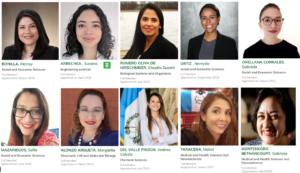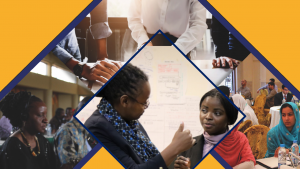Engaging with government: experiences from the VakaYiko programme
The INASP-led VakaYiko project aims to increase the capacity of policy makers to respond to research uptake needs. In this post, INASP’s Programme Assistant for the Evidence-Informed Policy Making programme, Shahenda Suliman, discusses some experiences from the VakaYiko programme of engaging with governmental institutions.
Managed by INASP, VakaYiko is a three-year project involving five organizations working as a consortium in Ghana, South Africa and Zimbabwe. The first year of the VakaYiko project witnessed the organizations establish and maintain working relationships with the following institutions in Ghana, South Africa and Zimbabwe:
- Ghana: The Civil Service Training Centre (CSTC)
- South Africa: The Department of Environmental Affairs (DEA)
- Zimbabwe: The Ministry of Industry and Commerce; the Ministry of Youth, Indigenisation and Economic Empowerment; and the Parliament of Zimbabwe
During the consortium’s quarterly meetings, the organizations discussed their early experiences attempting to secure engagement with these various institutions, and some common themes began to emerge across the three strands. This paper is an attempt to document some of the key approaches and challenges identified during the early days of engagement, whilst also reflecting on the advantages and disadvantages to working as part of a broader consortium.
Processes and hierarchies
One of the first things we learnt – and perhaps we were a bit naïve in this area – was the sheer level of processes and hierarchies that exist at the government level. For example, we really underestimated the time it took between getting verbal commitment from an institution and actually receiving the formal documents needed to start a project. In one meeting concerning perceived delays to the project, an exasperated partner explained: “all these supposed ‘delays’ we’re experiencing – they’re not delays; this is just how long things take here in government.” We’ve learnt a lot about the various processes and hierarchies within the institutions we are working with and the need to dedicate greater time to developing relationships prior to project launch.
On contextual relevance
One of the things that surprised me when I first started working in development (in the UK) was the way in which a number of practitioners spoke about relevance and context – almost like it were a checkbox you could tick. With VakaYiko, we don’t really ask “is this contextually relevant” (it’s much easier to tell when something isn’t), but rather “how can it become more relevant?” And whilst we try to always start with the political context, we also need to understand better the specific institution’s environment, an issue that is related to the previous point about how we underestimated processes.
For example, one can have a strong understanding of the politics of indigenization in Zimbabwe, without knowing much about how the Ministry of Youth, Indigenisation and Economic Empowerment operates. The consortium may have had a combined understanding of the political context(s) and of EIPM, but our familiarity with the way these specific government institutions worked was generally limited. In both Ghana and South Africa, further partnering with people who had worked directly with the institutions and policy makers in question really helped us to secure support and commitment, as this indicated that the work would be (more) relevant to the specific institution’s needs.
Resisting the constraints of the project design
Although three years doesn’t seem like a lot in project time, much can happen politically in three years: policy makers get elected or ejected, ministries are dissolved or absorbed, government priorities change, and (sometimes) governments themselves change. On the face of it, there’s little sense in sticking rigidly to milestones and log frames as the political backdrop changes. In reality, when your milestones are linked to payments, there is an incentive to stick to the original plan even if you privately think it’s no longer the best plan. We are trying to resist this pitfall through the following:
- Not setting narrow milestones: For example, from our early experiences with this programme we realised that instead of having a Memorandum of Understanding (MOU) as a milestone, we should have aimed for any evidence of commitment; the goal is commitment after all, not the MOU.
- Redesigning if necessary: Rather than just ask “is what we are doing relevant to the workplan?” there’s also a need to ask “is this workplan still the best way of doing what we want to do?” and be prepared to change or even overhaul a project if necessary.
- Taking an iterative approach if possible: In South Africa, the organizations adopted an approach whereby the diagnostic phase was scoped, but the change strategy and implementation phase remained open – this enabled them to effectively adapt to the evolving needs of the department.
Sitting fees for civil servants
There’s no shortage of text out there lamenting the ‘culture of sitting fees’ amongst civil servants in developing (mostly African) countries. Sometimes this descends into cultural essentialism and discussions about whether it’s considered impolite in some cultures not to gift civil servants with cars for attending meetings. For VakaYiko, it was more of a reputational issue; some civil servants expected sitting fees because donor-funded projects had a reputation for paying generous sitting fees. The issue was therefore less about their effectiveness in securing engagement, and more about the reputational risks and what this meant for the broader relevance and sustainability of the project.
“Engagement is a continuous process”
VakaYiko is now well into its second year with new approaches, new opportunities, and new challenges emerging. Engagement is a continuous process, and securing commitment is only the beginning – developing and sustaining the working relationships required to execute a collaborative project successfully requires substantial time and work. Documenting our early experiences has enabled us to reflect critically and openly on our approaches and although their relevance changes with time and space, we hope to continue with this process for the duration of the project and beyond.
For more information, see our recently published report, Reflections on VakaYiko’s first year.





Thank you for sharing the insights. As young research uptake communication professional at the Kwame Nkrumah University of Science and Technology (KNUST) in Ghana, through the Developement Research Uptake in Sub-Saharan Africa (DRUSSA) programme, I have come to appreciate some of these challenges. Considering that the aim of these projects are to build our capacity to impact policy-making with evidence research through engagements in the short-term and hopefully encourage governements to research to support policy-making in the long-term i.e way after the project has ended, I tend to find some of these contextual challenges especially the sitting fees (sitting allowances we call them) very interesting but what do I know–“cultural essentialism”. One would have thought the goal would be to first sacrifice to acquire the capacity and find innovative ways to use it to benefit the system and respective institutions. Sooner than later comes potentially new streams of revenue coupled with some insitutional recognition not mention the obvious outcome of concrete evidence informed policies for accelerated societal and economic development; but no we tend to have monetized everything.
I commend your efforts and if that is what it would take, what can one do. I also like the agile and adaptive nature of the project. It is an approach, development partners can really consider.
Hi Courage, thanks for your comment. On sitting fees, I should clarify that the consortium has differing views on this, and it’s still a topic of contention. I am not sure I understand your points about sacrifices and the monetization of everything – is this in reference to the VakaYiko organisations, or the gov. institutions? Do please correct me if I’m wrong – is your suggestion that the organisations make a financial sacrifice in order to attain commitment, bearing in mind the desired outcome re: eipm?
Thanks in advance for clarifying – I would also be interested in hearing more about your experiences and KNUST’s work in this area if you could kindly share any links.
Thank you for the response and allowing me share my thoughts on the subject.
By sacrifice, I am assuming the consortium just like in my case the DRUSSA programme, is investing in building our capacity. So I am imagining myself asking for sitting fees for every workshop or short course funded and I have been given the opportunity to attend. Please do not get me wrong, it would be appreciated if there was enough to compensate for the time and the opportunity cost. However, considering the individual benefit, and the potential institutional benefits thereof, it is a sacrifce/opportunity worth taking if I am not given sitting fees.
But as things stand it seems it is a thing that exist and is not going away soon: the reality on the ground. So may be the consortium can consider making that sacrifice as you rightly alluded to–“organisations make a financial sacrifice in order to attain commitment, bearing in mind the desired outcome re: eipm”
Monetization in my case refers things/help that I know in the past people would offer/engage in without being paid anything are all attracting some kind of monetary incentive. For example, if I were a government institution and a development partner/donor is helping make my institution more effective at delivering good social, economic and livelihood improving policies, should I be more worried about the opportunity cost and how to be compensated for it or how to measure the impact of the outomes? The situation is definitely complex when you consider the politics involved, so I understand that when you have a not-so-well resourced intstituion and motivated staff, may be it is one way to go.
I am stilling trying to understand some of these dynamics as an African and a young researcher looking for effective ways to harness the brilliance of/in African science for national development. And evidence informed policy is a good place to start for me. I am in no way an expert on the subject matter. It is just a nagging I cannot seem to shake off, hence my sharing an opinion.
At the KNUST (with support from the Vice-Chancellor and Management through the DRUSSA programme), we are working on institutionalising research uptake/research uptake management at our University. Currently, we have had the opportunity to participate in a number of research uptake campaigns and also have an active research uptake communications blog on the University website (http://www.knust.edu.gh/drussa). The aspiration is that development research undertaken at the University would increasing be made more accessible to policy makers in Ghana and Africa.
Thank you.
Many thanks for sharing your thoughts, it’s really useful to hear from people working in the same area. I’ll avoid regurgitating the section on sitting fees from the paper, but my request for clarification was because I’m somewhat wary of such arguments (that one pay to secure commitment) – partly because in our case we found a negative correlation between a sustainable interest in the project, and payment requests. I therefore don’t know that our project would have been useful/beneficial for those individuals, I think we need to be humble enough to accept that it’s not.
I find your point about monetization interesting and wonder to what extent this is influenced by the fact that many donor-funded projects do provide generous fees and gifts, and so perhaps there is now an expectation/association? I think we need to focus more on the forest (strengthening institutional capacity) and less on the trees (“The Project”). If the latter hinders the former – if in order to get buy-in we end up indirectly promoting a system whereby those who can’t afford to pay are effectively ‘priced out’ of engaging with their own policymakers – then I’d argue it’s not worth it. Thinking about my own region, I don’t think I would be comfortable with organisations presuming their projects were worth promoting such a system.
There’s also the issue of low salaries for civil servants (or public sector employees in general) in some countries and the tendency to ‘top-up’ one’s income from other sources which I think you alluded to re: motivated staff, but that’s probably a different conversation :). I am also in noo way an expert on eipm, but I find these broader conversations interesting, so I really appreciate your insight and blog link.
Thank you for the response and allowing me share my thoughts on the subject.
By sacrifice, I am assuming the consortium just like in my case the DRUSSA programme, is investing in building our capacity. So I am imagining myself asking for sitting fees for every workshop or short course funded and I have been given the opportunity to attend. Please do not get me wrong, it would be appreciated if there was enough to compensate for the time and the opportunity cost. However, considering the individual benefit, and the potential institutional benefits thereof, it is a sacrifce/opportunity worth taking if I am not given sitting fees.
But as things stand it seems it is a thing that exist and is not going away soon: the reality on the ground. So may be the consortium can consider making that sacrifice as you rightly alluded to–“organisations make a financial sacrifice in order to attain commitment, bearing in mind the desired outcome re: eipm”
Monetization in my case refers things/help that I know in the past people would offer/engage in without being paid anything are all attracting some kind of monetary incentive. For example, if I were a government institution and a development partner/donor is helping make my institution more effective at delivering good social, economic and livelihood improving policies, should I be more worried about the opportunity cost and how to be compensated for it or how to measure the impact of the outomes? The situation is definitely complex when you consider the politics involved, so I understand that when you have a not-so-well resourced intstituion and motivated staff, may be it is one way to go.
I am stilling trying to understand some of these dynamics as an African and a young researcher looking for effective ways to harness the brilliance of/in African science for national development. And evidence informed policy is a good place to start for me. I am in no way an expert on the subject matter. It is just a nagging I cannot seem to shake off, hence my sharing an opinion.
Thank you.